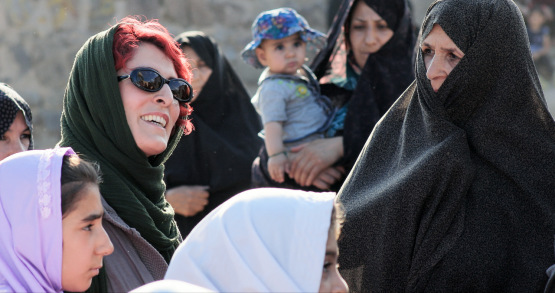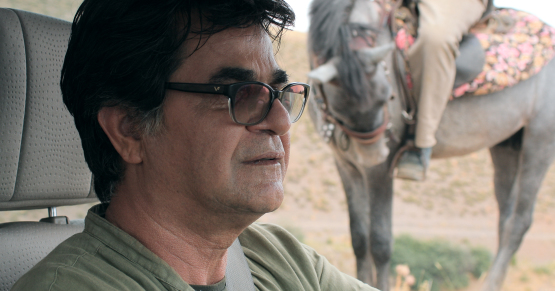
In 3 Faces, the latest from Jafar Panahi (The Circle, Taxi) we are plunged right into the story as images of a young woman on a smart phone talking directly to the camera. She is announcing that her life's in jeopardy because her parents have forbidden her from realizing her dream of acting. She then seemingly kills herself. For the next 90 minutes we follow the recipient of this message, Behnaz Jafari playing herself, a renowned Iranian actress and Panahi himself as they travel to a tiny village near the Turkish border to investigate.
There’s a mystery to solve. What happened to the young woman (Marziyeh Rezaei)? But also a deeper moral mystery; who are the inhabitants of her tiny village? Are they as nice and welcoming as they seem at first blush when Jafari and Panahi meet them? Deeper still is the moral quandary of a society that could drive a woman to take her own life just because she wanted to be actress...

Of course Jafari is an actress, so Panahi plays up the way she is always recognized by the villagers. She is constantly being asked to visit them in their homes and offered food and gits. At the same time everyone is mum on the fate of the young actress who’s one of their own. There’s even hostility when her name is mentioned. Later on, a third actress in introduced. Someone who used to be famous in pre-revolution Iran, but now lives of the outskirts of this village, shunned by everyone, not just in the village but in the whole country. It seems that her colleagues, her industry and her relatives have abandoned her. And therein lies the deeper mystery that Panahi is interested in; it’s one of oppression. Where it comes from and how it manifests. It’s evident in the dichotomy between the villagers being openly hospitable to Panahi and Jafari yet shunning their compatriots because of their disapproval of their art.
Panahi inserts himself into the film yet not into the mystery. He’s an observer. That is the right role for him since the oppression he’s investigating here is done by men. The men in the village and elsewhere who won’t allow these female artists to flourish. Panahi does not comment at all that 3 Faces is his fourth completed feature since he was officially banned from filmmaking by authorities in Iran. He doesn’t need to, the connection is apparent.

The cinema verite style fits the story he’s telling. No frills no flourishes. The overall story is more impactful than the repetitive shots from inside Panahi’s car as he and Jafari travel through the village. It is understandable that the shots are from his side as the observer, yet it becomes stale after a while. However 3 Faces made me want to know more about artists in pre revolution Iran and what happened to them post revolution. That’s a sign that the filmmaker accomplished just what he set out to do.
Grade: B
3 Faces is now in release.